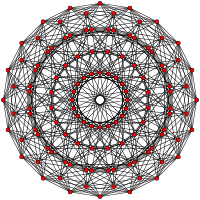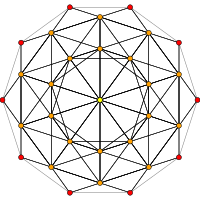| Great 120-cell | |
|---|---|
 Orthogonal projection | |
| Type | Schläfli-Hess polytope |
| Cells | 120 {5,5/2} |
| Faces | 720 {5} |
| Edges | 720 |
| Vertices | 120 |
| Vertex figure | {5/2,5} |
| Schläfli symbol | {5,5/2,5} |
| Coxeter-Dynkin diagram | |
| Symmetry group | H4, [3,3,5] |
| Dual | self-dual |
| Properties | Regular |

In geometry, the great 120-cell or great polydodecahedron is a regular star 4-polytope with Schläfli symbol {5,5/2,5}. It is one of 10 regular Schläfli-Hess polytopes. It is one of the two such polytopes that is self-dual.
Related polytopes
It has the same edge arrangement as the 600-cell, icosahedral 120-cell as well as the same face arrangement as the grand 120-cell.
| H4 | - | F4 |
|---|---|---|
 [30] |
 [20] |
 [12] |
| H3 | A2 / B3 / D4 | A3 / B2 |
 [10] |
 [6] |
 [4] |
Due to its self-duality, it does not have a good three-dimensional analogue, but (like all other star polyhedra and polychora) is analogous to the two-dimensional pentagram.
See also
- List of regular polytopes
- Convex regular 4-polytope
- Kepler-Poinsot solids regular star polyhedron
- Star polygon regular star polygons
References
- Edmund Hess, (1883) Einleitung in die Lehre von der Kugelteilung mit besonderer Berücksichtigung ihrer Anwendung auf die Theorie der Gleichflächigen und der gleicheckigen Polyeder [1].
- H. S. M. Coxeter, Regular Polytopes, 3rd. ed., Dover Publications, 1973. ISBN 0-486-61480-8.
- John H. Conway, Heidi Burgiel, Chaim Goodman-Strauss, The Symmetries of Things 2008, ISBN 978-1-56881-220-5 (Chapter 26, Regular Star-polytopes, pp. 404–408)
- Klitzing, Richard. "4D uniform polytopes (polychora) o5o5/2o5x - gohi".
External links
- Regular polychora Archived 2003-09-06 at the Wayback Machine
- Discussion on names
- Reguläre Polytope
- The Regular Star Polychora